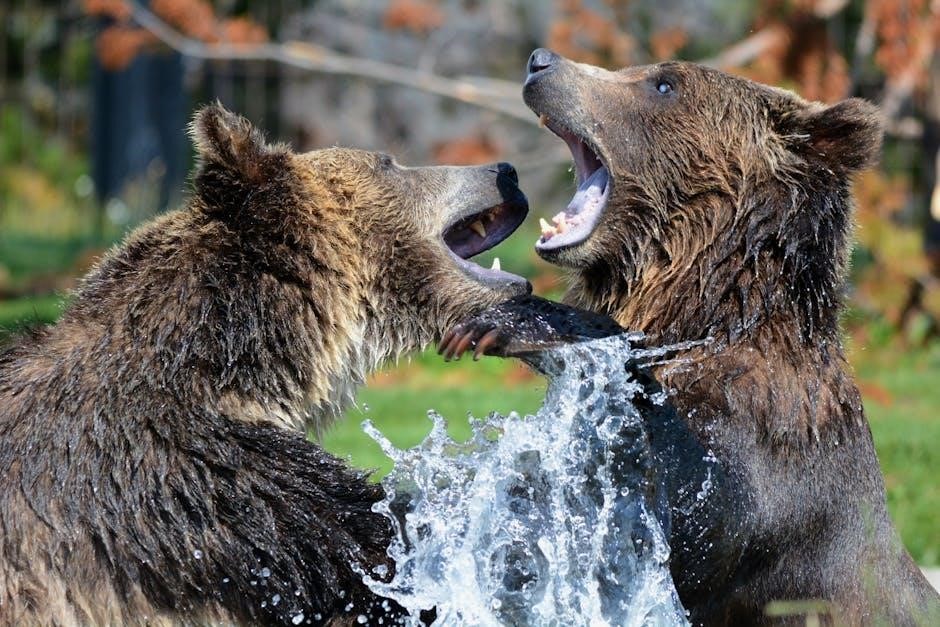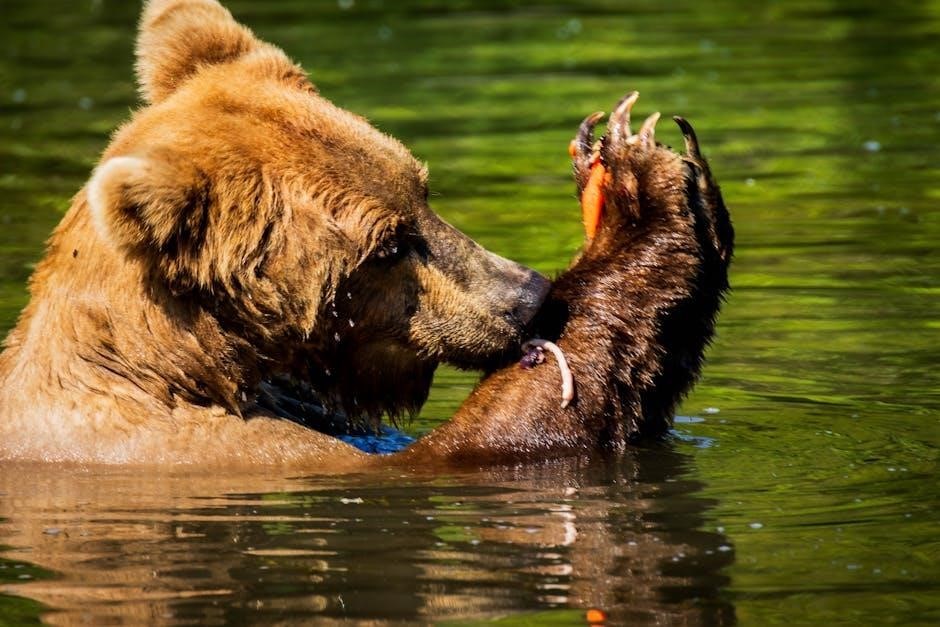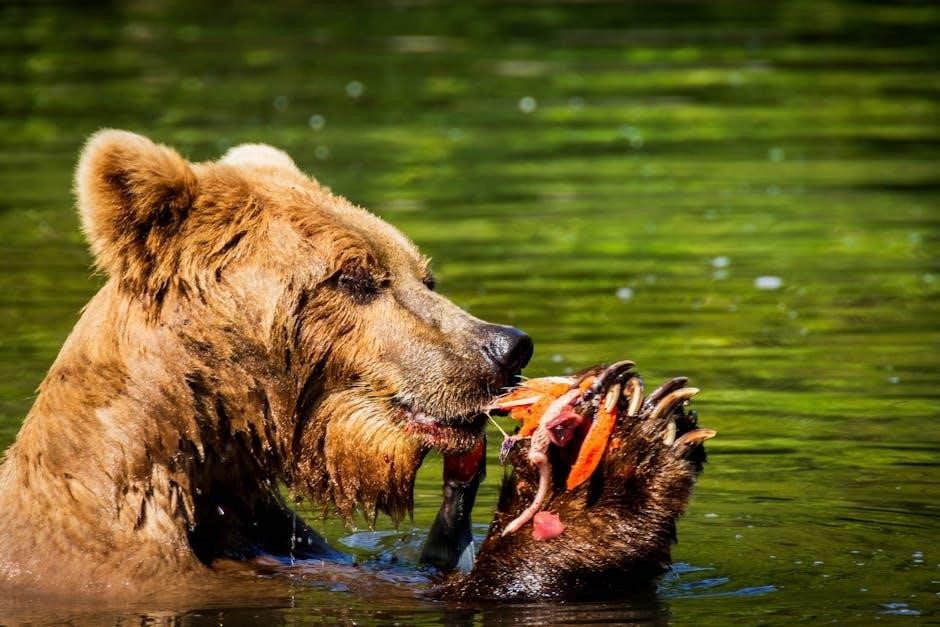Michigan offers exceptional guided bear hunting experiences, combining expert guidance with pristine wilderness. Hunters enjoy well-planned trips, ensuring safety and success in the Upper Peninsula’s renowned bear country.
Overview of Bear Hunting in Michigan
Michigan’s bear hunting is a popular outdoor activity, offering thrilling experiences in its vast wilderness. The Upper Peninsula (UP) is particularly renowned for its healthy black bear population. Hunters often target areas like Bergland and Carnie units, known for productive habitats. Guides play a crucial role, providing expertise and ensuring safe, successful hunts. With proper planning and knowledge of regulations, hunters can enjoy a rewarding adventure. Michigan’s bear hunting season attracts enthusiasts from across the country, making it a cornerstone of the state’s outdoor traditions.
Why Choose a Guided Hunt in Michigan?
A guided hunt in Michigan offers unparalleled expertise and local knowledge, enhancing your chances of success. Guides understand bear behavior, habitat, and seasonal patterns, ensuring a well-organized expedition. They handle logistics, from permits to equipment, allowing hunters to focus on the experience. With access to prime locations like the Upper Peninsula, guides provide insights into top hunting zones. Their assistance is invaluable for both novice and seasoned hunters, making the adventure safer and more enjoyable. Choosing a guided hunt maximizes your opportunity to harvest a trophy bear effectively.
Understanding Michigan Bear Hunting Regulations
Michigan’s bear hunting regulations ensure sustainable management of the bear population. Strict license requirements and season dates are in place to maintain ecological balance and hunter safety.
License Requirements and Tags
Obtaining the proper licenses and tags is essential for bear hunting in Michigan. The Michigan Department of Natural Resources (DNR) requires a base license and a bear-specific tag. Hunters must apply through a lottery system, with preference points increasing chances over time. Costs vary for residents and non-residents, and tags are limited to specific hunting units. Guides often assist with the application process, ensuring compliance. Failure to adhere to licensing rules can result in penalties. Understanding these requirements is crucial for a legal and successful hunt in Michigan’s bear country.
Season Dates and Bag Limits
Michigan’s bear hunting seasons typically occur in September and October, with exact dates varying by region and management unit. The state imposes strict bag limits, allowing one bear per hunter annually. Harvested bears must be reported to the DNR within 72 hours. Bag limits help conserve bear populations while ensuring sustainable hunting opportunities. Hunters must adhere to these regulations to maintain ecological balance and avoid penalties; Guides often provide insights into seasonal timing and regional limits, enhancing the likelihood of a successful and compliant hunt in Michigan’s diverse bear habitats.

Choosing the Right Guide Service
Selecting a reputable guide service is crucial for a successful Michigan bear hunt. Experienced outfitters like 906 Outdoors and Pine Creek Outfitters offer local expertise, ensuring ethical and safe hunting practices.
Reputable Outfitters in Michigan
Michigan boasts several trusted guide services known for their expertise in bear hunting. Outfitters like 906 Outdoors and Pine Creek Outfitters offer exceptional guidance, leveraging local knowledge and years of experience. Located in the Upper Peninsula, these services provide well-organized hunts, ensuring safety and success. They specialize in baiting and dog hunting, methods proven effective in Michigan’s bear country. Their commitment to ethical practices and hunter satisfaction makes them top choices for both novice and seasoned hunters. Researching and booking with these reputable outfitters can elevate your hunting experience and increase your chances of a successful harvest.
What to Expect from a Guided Hunt
A guided bear hunt in Michigan offers a well-organized and strategic experience. Expect expert guides to handle logistics, from baiting sites to tracking bears. Hunts typically involve early mornings and late afternoons, with guides using proven methods like baiting or dog hunting. They will educate you on bear behavior, ensuring safety and ethical practices. Many outfitters provide gear, meals, and lodging, creating a seamless adventure. Their local knowledge and experience maximize your chances of success, making the hunt both enjoyable and rewarding. Preparation and communication with your guide are key to a productive and memorable experience.
Best Locations for Bear Hunting in Michigan
Michigan’s Upper Peninsula offers prime bear hunting locations, with units like Bergland and Carnie providing abundant opportunities. Experienced guides and outfitters ensure a successful and memorable hunt.
Top Bear Hunting Zones in the Upper Peninsula
The Upper Peninsula of Michigan is renowned for its exceptional bear hunting opportunities. Key zones include the Bergland and Carnie units, known for their dense forests and abundant wildlife. These areas are favored by experienced hunters and guides due to their high bear populations and accessible terrain. Outfitters like 906 Outdoors and Pine Creek Outfitters offer expert guidance, enhancing the chances of a successful hunt. The region’s pristine wilderness and diverse ecosystems make it a premier destination for bear hunting enthusiasts seeking both challenge and reward.

Preparation for a Successful Hunt
Preparation is key to a successful Michigan bear hunt. Research, permits, and physical conditioning are essential. Coordinate with guides, check gear, and plan meticulously for optimal results.
Essential Gear and Equipment
For a successful Michigan bear hunt, essential gear includes a reliable rifle or bow, sturdy tree stands, and trail cameras for scouting. High-quality optics and scent-control clothing are crucial for concealment. Durable boots, layered hunting apparel, and weather-resistant gear ensure comfort in varying conditions./tree stands, trail cameras, and scent-control clothing. A first aid kit, bear spray, and field-dressing tools are vital for safety and post-harvest preparation. Proper equipment ensures hunters are well-prepared for Michigan’s rugged terrain and unpredictable weather, maximizing their chances of a successful and safe hunting experience.

Hunting Strategies and Techniques
Michigan bear hunting often employs baiting, spot-and-stalk, and tree stand methods. Guides utilize scent control and call tactics to increase success rates in the state’s dense forests.
Common Methods Used in Michigan Bear Hunts
Michigan bear hunts often employ baiting stations, spot-and-stalk tactics, and tree stand setups. Guides use scent control and call tactics to attract bears. Baiting involves placing food like corn or honey in strategic locations to draw bears consistently. Spot-and-stalk requires patience, as hunters move quietly through dense forests to locate their prey. Tree stands are elevated platforms that provide a clear vantage point for monitoring bait sites or trails. These methods are tailored to Michigan’s terrain and ensure a higher success rate for hunters.
Safety and Ethics in Bear Hunting
Understanding bear behavior and using ethical practices are crucial for safe hunting. Hunters must respect wildlife, avoid conflicts, and ensure humane, sustainable practices during their guided hunts.
Understanding Bear Behavior and Safety Tips
Understanding bear behavior is essential for a safe hunting experience. Black bears, common in Michigan, are generally shy but can act defensively if surprised. Keep a clean camp, store food securely, and remain alert while hunting. Making noise while moving through the woods can help avoid surprising bears; If a bear approaches, stay calm and follow ethical practices to ensure a safe outcome for both you and the animal. Knowledge of bear behavior enhances safety and ethical hunting practices.

Post-Hunt Procedures
After a successful hunt, proper field dressing and handling of the bear are crucial. Ensure the carcass is processed and preserved according to Michigan’s wildlife regulations.
Field Dressing and Preserving the Harvest
After harvesting a bear, immediate field dressing is essential to ensure quality and safety. Skinning and cooling the carcass promptly prevents spoilage and maintains meat quality. Guides typically assist with proper techniques to avoid contamination. Once dressed, the meat should be stored in a clean, cool environment. For longer preservation, freezing or professional processing is recommended. Proper handling ensures the bear’s meat remains fresh and safe for consumption. Always follow Michigan’s wildlife regulations for processing and transporting harvested game.
Michigan guided bear hunts offer an unforgettable experience, combining expert guidance with thrilling adventures. Hunters leave with lasting memories and a deep appreciation for the wild.
Final Thoughts on Michigan Guided Bear Hunts
Michigan guided bear hunts offer an exceptional experience for hunters seeking adventure and success. With expert guides providing valuable insights and strategies, hunters can maximize their chances of a fruitful hunt. Reputable outfitters like 906 Outdoors and Pine Creek Outfitters ensure a well-organized and safe expedition. Beyond the thrill of the hunt, these guided tours often support conservation efforts, promoting a balance between hunting and environmental stewardship. Whether you’re a seasoned hunter or a novice, Michigan’s guided bear hunts promise unforgettable memories and a deeper connection to the wilderness.